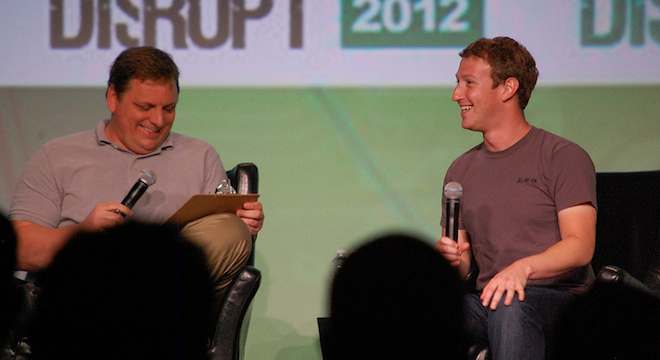Facebook’s 28-year-old founder and CEO Mark Zuckerberg isn’t known for giving particularly smooth press interviews (quite the contrary, actually) but on Tuesday, he decisively mastered his first Q-and-A session following his company’s debut on the Nasdaq and the massive decline in its stock price that has ensued.
Appearing on the stage at the Concourse of the San Francisco Design Center for the TechCrunch Disrupt conference, Zuckeberg confidently and seemingly candidly fielded over 20-minutes-worth of questions from TechCrunch founder Michael Arrington.
Zuckerberg touched upon a range of subjects related to Facebook and its future potential, revealing new information on everything from Facebook’s recently completed acquisition of popular photo-sharing app Instagram, its stumbles in mobile app development for the iPhone and Android devices, its ambitions for building up its search engine and yes, even the state of the long-rumored Facebook phone (spoiler alert: Zuckerberg came as close as ever to saying a firm, clear “no.” But it still wasn’t a “no.”)
In fact, Zuckerberg did such a good job at the interview, that tech bloggers immediately attributed a subsequent sudden, after-hours jump in the price of Facebook shares to Zuckerberg’s performance.
Watch the full interview below via TechCrunch:
Here’s a roundup of the information Zuckerberg shared during the interview, divided by general topic category:
Zuckerberg said the photo-sharing app Facebook acquired for $1 billion in April has now crossed 100 million users, up from 80 million reported by the company in June and officially listed on Instagram’s website.
Zuckerberg further said that Facebook would continue to allow Instagram to develop its own app and network independently of Facebook.
Facebook’s biggest mistake: Betting too much on HTML5 rather than native mobile apps for Android and iOS
Zuckerberg has been open about Facebook’s challenges in developing good mobile experiences for Facebook users and increasing advertising sales opportunities for his company on mobile devices. But never before has he been so stark in admitting that Facebook dropped the ball on mobile as he was on Tuesday, a mistake he attributed to incorrectly believing that Facebook would be better spent building a web-based, or HTML5 version (that’s the markup language used to render webpages) of Facebook’s mobile apps first, rather than focusing on native (that’s installed apps) on the Android OS and Apple’s iOS for iPhone and iPad.
As Zuckerberg put it plainly: “The biggest mistake we made as a company was betting too much on HTML5, because it’s just not there yet.”
Zuckerberg said that Facebook made its bad bet on HTML5 two years ago, that it took six months to get the system, called “FaceWeb” working, then another four months to figure out it wasn’t working well and the company shouldn’t pursue it, and another year to get Facebook to the point where it is now on mobile, having just released an improved, faster version of Facebook for Apple’s iOS that ditches HTML5.
“We burnt two years,” he told Arrington, “It was really painful. It was our biggest strategic mistake.”
Facebook Search
Asked about if Zuckerberg was irked by Google Plus, the search giant’s new social network and clear competitor to Facebook, the young founder dismissed it blithely and proceeded to talk about how Facebook’s own built-in search engine was already successful despite being bare bones, and that the company was looking at it as an “obvious” area that it could expand upon, potentially putting Facebook into greater conflict with not only Google, but Yelp and career-focused social network LinkedIn.
“We do on the order of a billion queries a day and we’re basically not even trying,” Zuckerberg told Arrington regarding Facebook Search, noting that while most searches were people looking for names of other Facebook users and Friends, a “meaningful number” of searches were also made for brand pages and apps.
“We think there’s a big opportunity there,” Zuckerberg said, later expounding, “Facebook is pretty uniquely positioned to answer the questions people have,” giving the example of “‘What sushi restaurants have my friends gone to in New York in the past six months and liked?'” and another example of “‘Which of my friends and friends of friends work at this company I’m interested in?’ so I can talk to them about what it’s like to work there.”
Zuckerberg’s comments were so favorable to the idea of an expanded Facebook Search engine that could rival Google and Bing that Wired’s Ryan Tate published a piece titled “Facebook Search All But Announced by Mark Zuckerberg.”
Facebook Phone
Arrington repeatedly questioned Zuckerberg about the idea of a Facebook smartphone throughout the interview, but Zuckerberg consistently denied that the company was working on anything of the sort.
“That’s always been the wrong strategy for us,” Zuckerberg told Arrington in regards to the idea of Facebook-built and/or branded smartphone.
Instead, Zuckerberg said that Facebook’s goal was to become as “deeply as possible integrated into every device,” including new Android devices and the iPhone. Specifically, Zuckerberg pointed out that the forthcoming release of Apple’s new iOS 6 mobile operating system would usher in much more seamless Facebook integration with Apple’s iPhone and iPad.
Concerning Android, Zuckerberg said “we think we can do really interesting stuff,” and “go deep on our own,” because of the fact that it is an open source operating system, as opposed to Apple’s more rigidly controlled, top-down approach toward third-party development on the iPhone and iPad.
Still, when asked about an updated Android-specific Facebook app, Zuckerberg declined to offer any specific estimated release date, let alone features.






